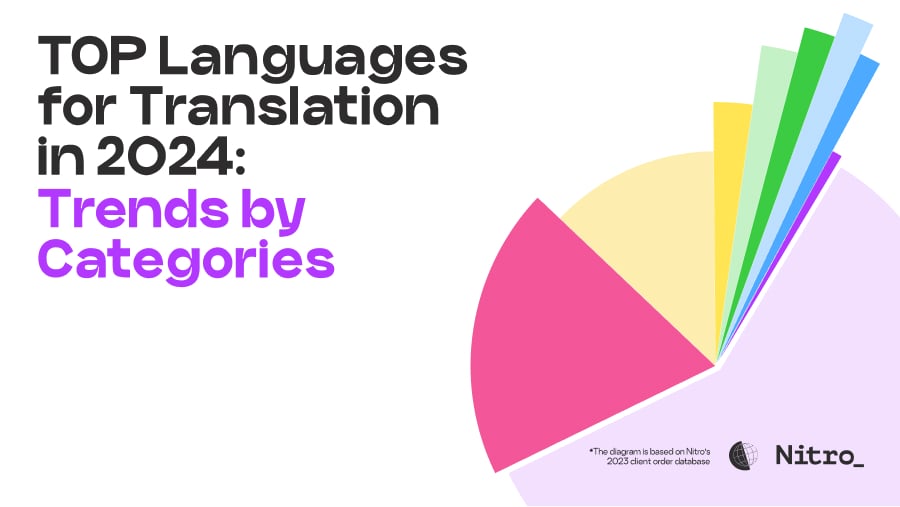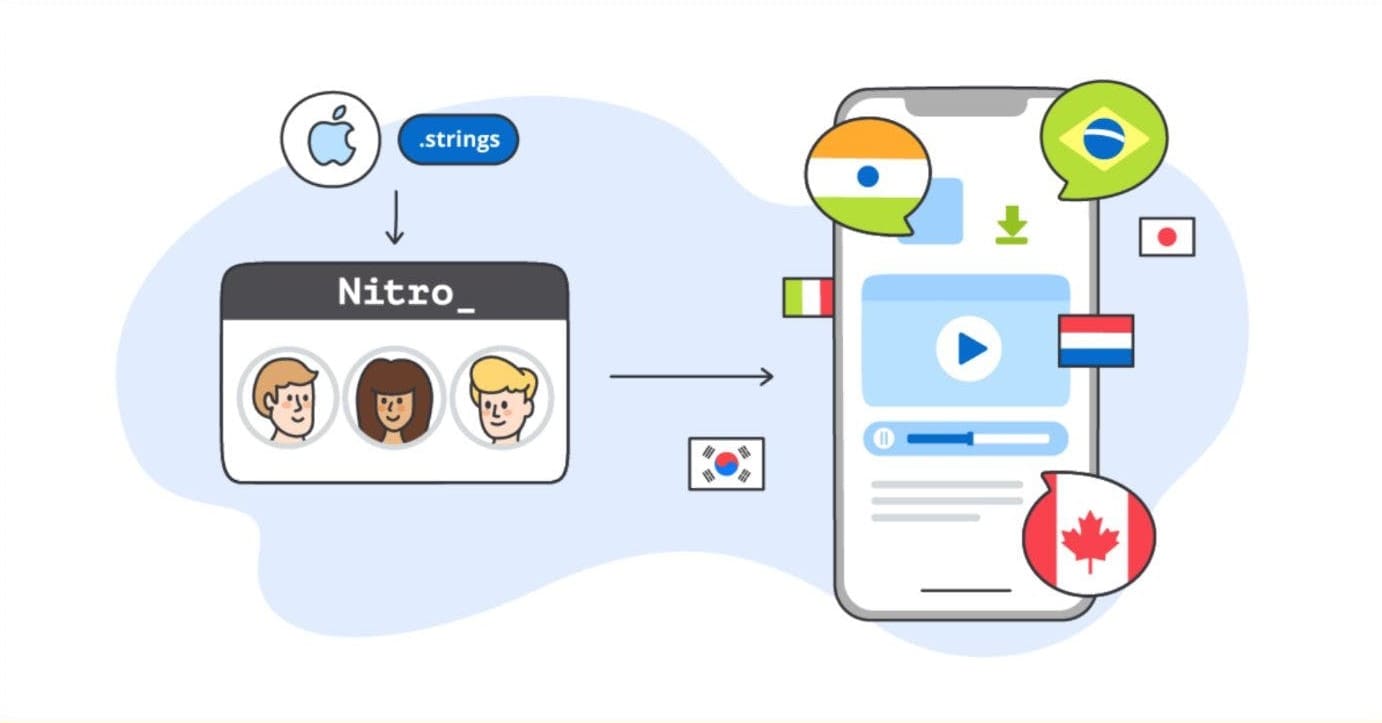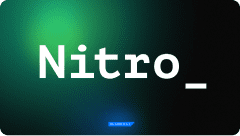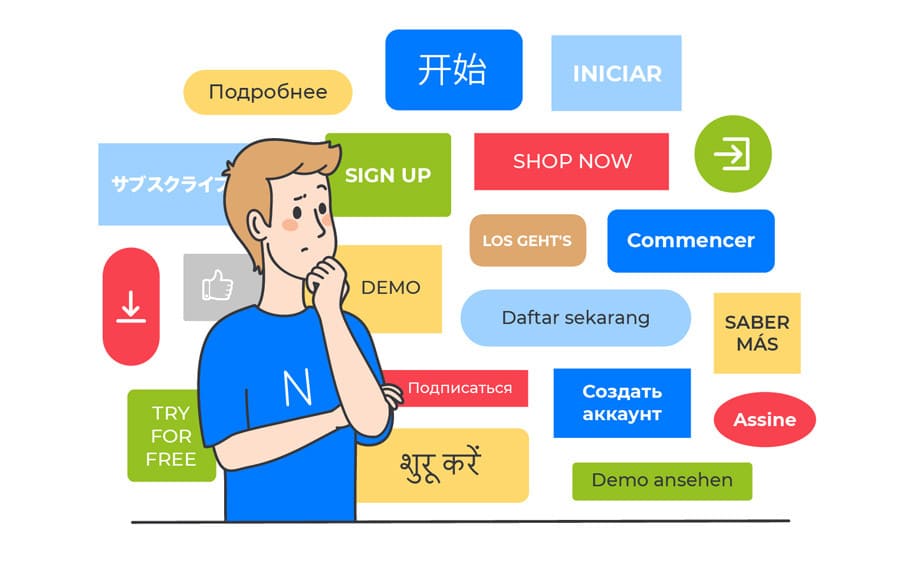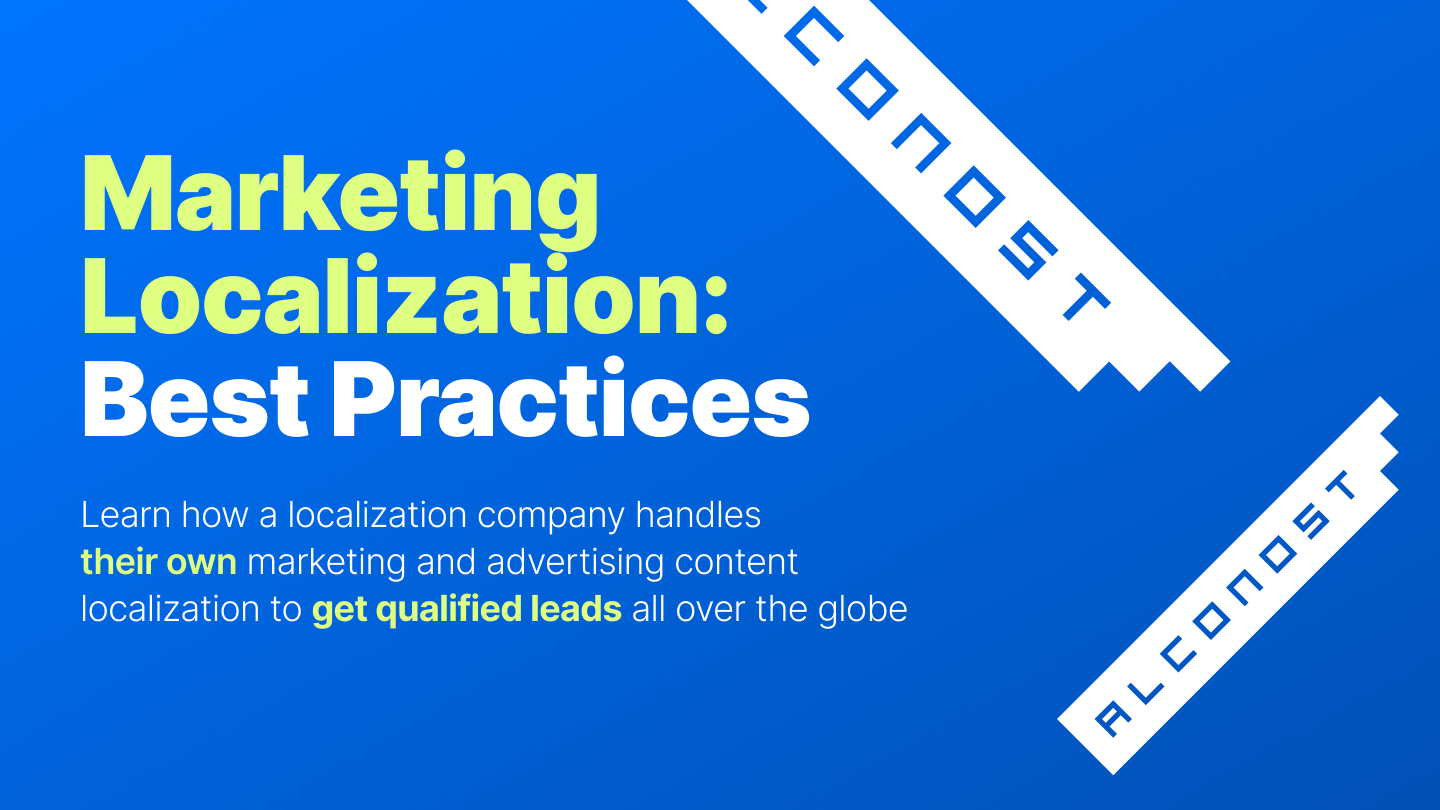Staying ahead of the curve isn't just about adapting to changes; it's about anticipating them. At Nitro, the online platform for native human translations, we embrace this challenge every year. For a couple of years now, we've crafted a comprehensive report on the most in-demand languages for translation among Nitro users. By analyzing our 2023 order database, we aim to spot insights into evolving trends in the translation and localization industry for 2024.
In this article, we'll offer our traditional reveal of which languages were the most popular on Nitro in 2023 in general and across apps, games, marketing, and e-commerce. Our analysis is rooted exclusively in internal data from Nitro's 2023 order database, which offers a unique lens on the shifting preferences in global communication. Let's see what the figures have to say.
TOP 10 languages for translation: General Overview
Top languages for translation by Category
Top languages for translation: Apps
Top languages for translation: Games
Top languages for translation: Marketing
Top languages for translation: E-Commerce
Top 10 languages for translation
In 2023, Nitro users translated their content into 60 language pairs. Here are the top 10 target languages:
- French
- German
- Spanish
- Portuguese (Brazil)
- Italian
- Japanese
- Chinese (Simplified)
- Ukrainian
- Korean
- Turkish

The most popular languages for translation on Nitro in 2023 were French, German, and Spanish. That's no surprise. These languages have topped our сhart for the last couple of years. Along with Italian, they're considered the "localization classics" or FIGS (French, Italian, German, and Spanish). This time, however, Italian was knocked out of the traditional FIGS domination by a newcomer, Portuguese (Brazilian), which improved its ranking fourfold within a year, acquiring an additional 1.8% of orders compared to 2022.
In 2023, Brazil jumped two places and became the ninth-largest economy in the world. According to the IMF, Brazil could rise further to become the eighth-largest economy on the planet by 2026. But we won't delve too far into macroeconomics. Why do companies want to enter the Brazilian market? The answer is simple: There are over 200 million potential users, buyers, and clients, 90% of whom are under 64. Only a small fraction of them (5%) speak proficient English. As such, if you're wondering whether you need to have your product translated into Brazilian Portuguese, the answer is clear: if you don't, you'll miss the majority of Brazilian users.
The Asian favorites from 2022 — Japanese, Chinese (Simplified), and Korean — have slowed down a bit, now occupying 6th, 7th, and 9th places, respectively. A slight decline in Asian languages is understandable since the market has become a little more competitive compared to 2022. However, when looking at the actual figures, we can see that the decline was only less than 0.5%. Asian markets are still experiencing high demand, as we anticipated in our previous report's findings.
The Ukrainian language made it to our Top 10, occupying 7th place with 3.7% of all orders. In 2022, it accounted for 0.6% and was only in the Top 30.
Turkish closes the Top 10 chart for 2023, reflecting the annual interest in that market's products.

Since we've been collecting this data for two years in a row, let's see what insights and tendencies it can bring us in each individual category.
Top 10 Languages for Translation by Category

Before digging into languages by category, let's see which categories were the most popular on Nitro in 2023. Apps and Games are traditionally in the top two. We asked our clients why they prefer to translate their apps and games on Nitro, and these were the top responses:
- "Many languages" [over 70 languages available (hereinafter, editor's note in brackets)]
- "Fast" [within 24 hours]
- "Don't have to bother a project manager for a request worth a few US dollars" [Nitro accepts orders from 1 word]
- "Fed up with e-mails (and sometimes they get lost)" [about managing freelance translators via e-mail]
- "It's simple" [about Nitro's interface]
- "The ability to leave context and notes for translators".
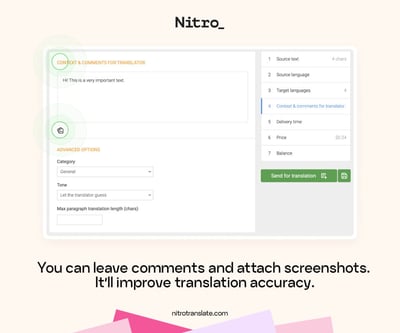
"I oversee localization at CM Games, and sometimes, we need to translate small pieces of text or some words and do it promptly. Nitro is perfectly tailored for such requests. All you need to do is upload your text strings and add some comments (or context) for translators. The translation will take several hours and sometimes minutes. My all-time record was two minutes from the moment I sent the order! I enjoy all aspects of this tool."

Elizaveta Kozlova, Localization Lead & Linguistic Support Manager at CM Games
Top 10 Languages for Translation: Apps
In 2023, Apps were translated into 51 language pairs. Here are the top 10 target languages:
- Italian
- Spanish
- French
- German
- Portuguese (Brazil)
- Chinese (Simplified)
- Japanese
- Dutch
- Korean
- Turkish

Just as in 2022, Italian tops the chart for localizing Apps. FIGS, along with Brazilian Portuguese, comprise the Top 5. Although Japanese dropped from 3rd in 2022 to 7th place in 2023, the actual amount of order shares decreased by just 0.5%. Chinese (Simplified) remained in the same 6th place, although it experienced a 0.9% rise in orders over the year. In 2023, Korean made it to the top 10 for apps, moving up from 12th place. The predicted tendency of the growing popularity of the Asian languages has been proven once again.
What's the #1 challenge in localizing digital products, especially apps?
It might sound overwhelming, but there's no final point when it comes to localizing your app. Once started, the process never ends, neither for existing locales nor new ones. Prepare for the constant need to localize new content and updates into a growing number of languages simultaneously.
"There can never be an absolutely final translation." - Robert M. Grant
Last year, Nitro significantly eased the process for its iOS users by making it possible to upload .strings files for translation. This year, we expect to offer the same feature for .xml files to our Android developer user base. As a reminder, Nitro has a translation memory and never charges you for previously translated content. There's no need to manually extract untranslated strings each time you release an update. Nitro will do it for you!
Top 10 Languages for Translation: Games
In 2023, Games were translated into 60 language pairs. Here are the top 10 target languages:
- German
- French
- Spanish
- Portuguese (Brazil)
- Japanese
- Italian
- Korean
- Chinese (Simplified)
- Polish
- Turkish

The top languages for the gaming industry in 2023 were largely the same as in 2022, with only minor position shifts.
We already touched on the reasons for the popularity of Portuguese (Brazilian) earlier. It's crucial to note that this refers specifically to Portuguese (Brazil), not Portuguese (Portugal). Subtle differences can make Portuguese (Portugal) slightly uncomfortable for Brazilian readers. Some common wordplays in Portuguese (Portugal) can be awkward or even cringe-worthy in Portuguese (Brazil).
"Working with Brazilian users is also enjoyable. They are demanding but also responsive, giving us many ideas for ways to improve. Many of our apps have seen a ton of feedback, specifically from Brazil ." - Maxim Kolpakov, Wachanga
More about the Brazilian mobile gaming market can be found in this article. If you're considering Asian languages as the next step in your localization journey, the following articles, written together with field experts, may be of some help to you:
Top Languages for Translation: Marketing
In 2023, marketing materials were translated into 49 language pairs. Here are the top target positions, with Japanese and Portuguese (Portugal) sharing 10th place:
- English
- Portuguese (Brazil)
- French
- German
- Spanish
- Italian
- Polish
- Turkish
- Сzech
- Japanese
- Portuguese (Portugal)

English tops the chart in the marketing category. As surprising as it may seem initially, the reason is quite straightforward: our users from the marketing domain frequently utilize Nitro's Proofreading feature, where English serves both as the source and target language. Let's dive deeper into the reasons for it.
In 2023, we all witnessed a boom in artificial intelligence. However, despite the relatively good quality of AI-generated texts, readers started to spot them by the end of the year because of their structure and wording. AI is good for crafting ideas or proofreading texts in languages you know well, i.e., when you can assess the quality of the outcome yourself. Nevertheless, our diagram shows that as soon as marketers are satisfied with the outcome, even in English — a language they know — they still seek the expertise of a native translator for proofreading. Ultimately, it doesn't matter whether the text is initially crafted by AI or a bilingual marketer. The only way to ensure its accuracy is to let a native speaker take a look at it. Moreover, is asking AI to proofread a text in a language you don't know even helpful?
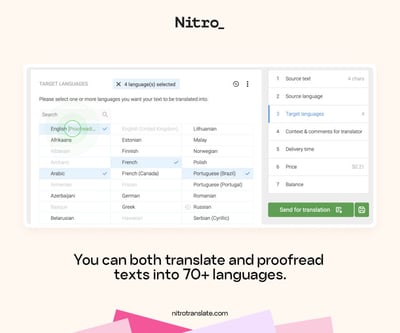
"Occassionally, I rely on AI to refine my written content for minor adjustments like improving flow, punctuation, or checking grammatical errors. However, when it comes to critical marketing content such as articles, newsletters, or client communication, I prefer to send my content to Nitro for proofreading. Their native-speaking translators have a keen eye for the stylistic nuances that machines often miss!"

Liza Diagel, Marketing Manager at Alconost
Another struggle for marketers is strict ad platform requirements. This is a tough feat for creative texts in one language, to say nothing about doing that for all languages of multilingual ad campaigns since the same words or phrases can have more characters when translated into different languages. How do you "marry" these strict character limitations for each different language? Not with AI because then you can't assess the quality of its translations into a bunch of languages and with a character limit on top of that. In this case, it's wise to seek the expertise of a native translator who will get your message right and adjust it to the character limit so that your content always fits perfectly without losing its impact.
Top Languages for Translation:
e-Commerce
In 2023, e-commerce businesses translated their content into 37 language pairs in Nitro. Here are the top target languages, with German, French, and Italian each having the same 8.4% share, as well as Romanian, Chinese (Simplified), and Dutch each coming in at 3.4%:
- Spanish
- German
- French
- Italian
- Polish
- Turkish
- Romanian
- Chinese (Simplified)
- Dutch
- Greek
- Finnish

European languages, Turkish, and Chinese Simplified were the priorities for e-commerce businesses in 2023. This shows that Nitro users consider it important to ensure better user experience even in countries known for their good grasp of English, like the Netherlands and Finland.
The Romanian and Greek languages deserve a closer look since this is the only category where they make it to the top 10. We believe the reason lies in a growing digital presence among the population and, thus, more businesses going online to meet the increasing demand for new internet users.
According to Statista, by the beginning of 2023, the number of internet users in Romania had increased by over one million compared to 2022!
"The average revenue per user in the e-commerce market in Romania was forecast to continuously increase by 13% between 2024 and 2028, reaching its new peak in 2028." - Statista.
According to Mordor Intelligence, Greek online buyers make more than 65% of their total physical purchases.
Though the English proficiency of Greeks and Romanians is ranked from moderate to very high, the situation in those countries is similar to Finland and the Netherlands: content in native languages is accepted more favorably.
The popularity of Polish, Turkish, and Dutch are investigated further below.
How to translate your e-commerce store into multiple languages
In Nitro, you can input plain text or upload Google Sheets or Google Docs to obtain professional translations for your e-commerce store. If you run your store on WordPress, you can export your website's texts in .xliff format. Unfortunately, there's no opportunity to translate this type of file in Nitro, but language service providers like Alconost can handle them.
If you run your store on Shopify, the common practice is to install a third-party translation app and get instant machine translation in a few clicks. Usually, the 'free' apps allow for only up to two languages, and the paid ones have monthly fees for a one-time machine translation job. If you aren't satisfied with the quality of machine translation, you'll probably be looking for ways to obtain professional translations for your store.
Jake Alexander, a Shopify expert, once showcased Nitro on his YouTube channel, @CasualEcommerce, in a video about translating a Shopify store into multiple languages. Spoiler alert: Installing a free third-party translation app is still necessary to manually input professional translations from Nitro. Translations can be pasted through this app's interface. Watch this 8 min tutorial to see how easy it is.
"We know that many Shopify businesses use machine translation apps to translate their online shops. They do it while still being aware of the risks: sloppy words, untranslated strings, truncation, etc. And I understand why. The transition from the simplicity of a machine translation app to the cumbersome management of freelance translators or demanding professional localization agencies might be too significant a move for some in terms of processes and costs. Nitro has been created to fill this gap. It combines the professional quality of translations with a certain level of autonomy, something highly valued by small to medium e-commerce businesses."

Diana Ivanenko, Product Manager at Nitro
What's beyond the Top 10?
Despite Dutch not cracking the top 10 in our general chart, instead taking 15th place, it remarkably made the top 10 in all categories except marketing and games, where it landed in 11th and 22nd places, respectively. This trend points to the Netherlands' robust payment capacity and advanced internet setup, as well as the high loyalty of Dutch users to content in their native language.
In 2023, Turkish ranked 10th, maintaining its position as a consistently chosen language for English localization over recent years. The presence of localization significantly increases the chances of a product's acceptance among users from Turkey since, according to the English Proficiency Index, Turks' English-language skills are rated "low".
Polish might have been slightly overlooked in our analysis, but its significance is more readily visible upon closer examination. While it ranked 11th in the general chart of top languages for 2023, its prominence in specific categories is noteworthy. It entered the Top 10 for both the Games and Marketing categories and appears in the Top 5 for e-commerce. But why is Polish emerging as a key player?
The answer lies in Poland's unique market dynamics. The sixth most populous country in Europe, it's home to over 38 million people, 75% of whom are regular internet users. Covid-19's impact on e-commerce has been profound worldwide, and Poland is no exception. It has swiftly become one of the fastest-growing e-commerce markets in Europe.
According to Statista, 100% of Polish internet users made purchases online in 2023.
If you plan to set foot in this vibrant market, it's a wise strategy to consider Polish as the next step in your localization strategy.
"Polish is an inflected language, which means that certain affixes carry important grammatical information about tense, gender, etc. As a result, Polish users tend to require more information than, for instance, users of English. It's much harder to write a gender-neutral text or universally applicable UI string in Polish, so be prepared to answer multiple questions about the characters of your game, recipients of messages, context, and location of a given text in the UI. Another thing that should be taken into account when translating into Polish is the length restrictions. Polish translations tend to be approximately 30% longer than the English source, mainly due to the length of words. On the other hand, Polish has great potential for humor and wordplay, and its native speakers really appreciate carefully localized UIs, games, and services. Therefore, investing in a high-quality translation for the Polish market is certainly a viable investment."

Gabriela Janiszewska, English-to-Polish translator at Nitro
How to start with localization: a quick tip
Localizing your product can take a significant investment, but choosing the right market is crucial to ensure your investment pays off. The challenge, therefore, lies in identifying which market to target, especially when errors can be costly.
Here's a practical, budget-friendly solution for testing the waters in the new markets. A cost-effective way to gauge a market's response is to translate only some minor elements, like descriptions, screenshots, keywords, and basic marketing information. This approach allows you to assess the market's interest without fully localizing the product itself.
Many of Nitro's clients have already used this tip. They start by localizing these smaller, less resource-intensive components. If these initial efforts show promising results, they proceed with full-scale localization of their product.
"I have a mobile game that has been translated into 23 languages, but now, when I make even a minor update to the game, I need to translate a few strings (e.g., release notes) quickly into all these languages before I can submit it to the app stores. Nitro makes this really easy.

Henry Smith, indie game developer
Conclusion
Poor localization is something that really takes your users out of the experience. It gives the impression that the localization team didn't care about the end product. Users refer to poor localization as "really annoying" and say it makes the product "look amateur".
In this article, we aimed to help you navigate your way through the mass of languages to choose from. We hope our unique perspective has brought some insights for your specific journey. Good luck with conquering the world this year! Remember: the devil is in the details. Your product deserves global attention. Quality localization is not a minor thing when it comes to acquiring a dedicated user base hungry for more.
About the company
Nitro is an online platform for native human translation, where certified native-speaking linguists perform translations into 70+ languages within 24 hours. It allows for both plain text input and file uploads, including Google Sheets, Google Docs, .strings (iOS), .json, .html, .csv and .txt, with .xml support coming soon. Nitro is powered by the ISO-certified, #inc5000 language service provider Alconost. Visit our website to learn more about Nitro's features or view a non-binding instant quote. No registration required.
Nitro is designed by developers for developers, and there's a personal story behind its creation. Watch it now!
"2023 was a remarkable year in Nitro's history. We released 35 new features, processed over 35,000 orders, and translated more than 10 million characters! We deeply appreciate our users' continued trust and support. Identifying weak points and addressing them with elegant solutions is what drives Nitro forward. And our users' needs are at the heart of it all." - Diana Ivanenko, Product Manager at Nitro.
.png)

